



Highly Overrated But Still Good
I think this is a new genre that they're all sort of working their way through it and haven't got all the kinks worked out yet but it's a genre that works for me.
View MoreThe film's masterful storytelling did its job. The message was clear. No need to overdo.
View MoreThere's a more than satisfactory amount of boom-boom in the movie's trim running time.
View MoreOh boy, this was made almost forty years ago and - what a surprise! - we are basically still stuck in the same traffic jam. Only today nobody bothers anymore with the whole anti-consumerism shtick, mainly, I suspect, because we have bought this lifestyle hook, line and sinker, ingesting it to a degree that it has now become our second nature. So, here's a lot to like and a lot to learn, social commentary not only on Italian but most of our contemporary Western societies. But be prepared, I am by no means a squeamish viewer, but there is this one scene where a strong, independent, likeable female character is gang raped by three devilishly handsome yuppie guys in the back of a baby food truck. All the while, four old guys armed to the teeth watch on as if the spectacle was put on display solely for their own amusement. I found this hard to swallow and putting a somewhat sour note on an otherwise provocative, critical but also thoughtful and clever movie. On the other hand, if you compare this movie to the utter politically correct drivel we are served nowadays in multiplexes everywhere, it feels almost like a breath of fresh air, despite the toxic fumes emanating from its mega congestion.
View MoreI haven’t been aware of this film for very long, one which I mentioned fairly recently while discussing Jean-Luc Godard’s WEEK-END (1967) with Michael Elliott in this very thread; I’ve now acquired it on DivX in a slightly trimmed version (113 minutes against the official 121), having learnt of the mixed reception to its DVD release in Italy (due to said length issues and dirt-riddled video).It features a remarkable cast of international stars: (in alphabetical order) Gerard Depardieu, Patrick Dewaere, Annie Girardot, Ciccio Ingrassia, Marcello Mastroianni, Miou-Miou, Angela Molina, Fernando Rey, Stefania Sandrelli, Alberto Sordi and Ugo Tognazzi, plus a host of other interesting supporting characters (including Pupi Avati regular Gianni Cavina). Luigi Comencini is an underrated Italian director, of whose work I’ve seen – not too long ago – EVERYBODY GO HOME (1960), Italian SECRET SERVICE (1968) and THE CAT (1977); I’ve also just acquired his BEBO’S GIRL (1963) which, at the time of release, counted Jean-Luc Godard among its admirers! Anyway, this savage black comedy (on which Bernardino Zapponi, Fellini’s regular screen writing partner around this time, had a hand) could perhaps have hit its satirical targets better – and it would have been even funnier with a greater director (say, Luis Bunuel) at its helm but it’s nevertheless well enough done; incidentally, Bunuel’s own son Juan Luis did actually serve as a second-unit assistant director on this Italo-Franco-German production! Several good (and a few memorable) vignettes abound: arrogant lawyer Sordi, accompanied by his long suffering assistant Orazio Orlandi, looking for an uninhabited place to take a crap among the car wreckages; poor man Cavina knowingly bartering his sexy wife Sandrelli for a night with stranded actor Mastroianni in return for a job as chauffeur to the stars at Cinecitta' and even intimating at blackmail due to the actor’s eventual non-performance in bed; Molina’s three-way rape in a delivery van caught in the traffic jam is witnessed by four aging and passive would-be vigilantes; Rey and Girardot, as a couple on their Silver Wedding Anniversary holiday quarreling bitterly (and bringing up their infidelities out into the open) about lost keys to their front door which were in Rey’s possession all along (although he slips them back into her handbag when she’s not looking); Dewaere’s chain-smoking manic depressive perennially hung up on his girl; a bald-headed man’s foul-mouthed aggression on his car is ‘silenced’ by a meek driver (by the end of the film, then, their positions are virtually reversed); Depardieu forever threatening to throw himself under the stationary(!) cars when he finds out that his wife (Miou-Miou) is Professor Tognazzi’s lover; still, the funniest bit is perhaps Rey’s insults traded with a reckless driver two cars away from him which is ‘passed on’ by a mild-mannered middle-man. Fiorenzo Carpi contributes the simple and sparse, yet highly effective, brooding music score.
View MoreDue to some other's comments, I decided to rent "L'ingorgo", hoping to see a real Italian styled "black comedy", a reflex of the early '50s Cinema d'Autore that left us many jewels, mixed with '70s socio-political satire.Instead, I had to watch a boring, tedious and even violent piece, filled with excellent actors and actresses, that in the beginning was truly promising, but then became a long, exasperating show, with no specific purpose.Particularly shocking is the scene of a rape, committed by 3 guys, and witnessed by others who, instead of stopping it by shooting their firearms to the air, discussed if it was worth watching it or not. Well, by the way the film turned, it's a relief the authors didn't choose to make those witnesses participate in the multiple rape.I didn't understand what Marcello Mastroianni's character meant, or why some things happened without consequences (the rape, the sacking of a truck, some crazy drivers, discussions, etc.).It didn't seem a "written" movie, but a spaghetti incident of talents mixed up like the traffic jam itself, and left alone with some cameras and microphones open as they moved and talked.If that was the purpose of this film, then I didn't quite get it like that.
View MoreSo few comments for the great Luigi Comencini!One of the best Italian directors in the heyday (sixties and seventies) of Italian cinema!"Ingorgo",like "lo scopone scientifico" ,is a modern fable.But whereas the former dealt with the power of money,the poor wops against the high and the mighty,the later involves the whole society,including the social worries.At first sight,it looks like an unspectacular disaster movie:the traffic jam acts reveals the deep malaise of the Italian (???) consumer society .The car,what a symbol!Long before Cronenberg("crash")and infinitely better than him,Comencini heralds the dead end of our era ,poisoned by selfishness,hypocrisy,wickedness and the God named car that man created...As Pollack a decade earlier had shown in "They shoot horses,don't they" an America going round in circles,Comencini shows here the end of the road.As in a disaster movie,there are a lot of subplots (no plot,no main character),but Comencini is too clever to follow the rules:except for Sordi and Mastroianni,the stars (Depardieu,Annie Girardot,Ugo Tognazzi,Miou Miou,et al) take a back seat to less familiar faces.A road movie,it is for sure.Everything happens on the road.And anything can happen.A desolate landscape,cars on the road,and along the wayside,wrecks of cars .And inside this apocalyptic world,the milk of human meanness,everyman for himself and God against us all!The movie reaches paroxysms of horror during a rape scene in a van during the night :the doors remains open:four bourgeois,in the car behind ,put on their headlights and relish with the girl's screams.(She might like that,one of the peeping toms says!They pay for such a show in town,another one replies)If there is a hope,as such is often the case in Comencini's world,it can be found in children's eyes.A little ray of light illuminates the darkness when a girl (sadly the one who will be assaulted)takes her guitar and sing a lovely tune for little boys and girls with cherubic faces.Another hope can be found in the reverend's words when he prays over the body of the man in the ambulance (stuck in the traffic jam too).Comencini's words indeed."Ingorgo" is an absolute pessimistic work.And the last pictures,displaying the populace ingurgitating jars of baby food comes as another symbol.Either man will be born again with a child's wisdom,or he will be doomed for eternity.Children are fathers to the man and so much more in Comencini's work:in "lo scopone scientifico" it's the daughter who's the most sensible;in "incompreso", a child suffers from the adults' indifference;in "cuore" the children who were carefully taught are sent to the war and lose all their illusions.Like most of Comencini 's works,it is a black comedy that cries to be seen.Comedy is a wrong word anyway when you verge constantly on human dumbness tragedy.
View More